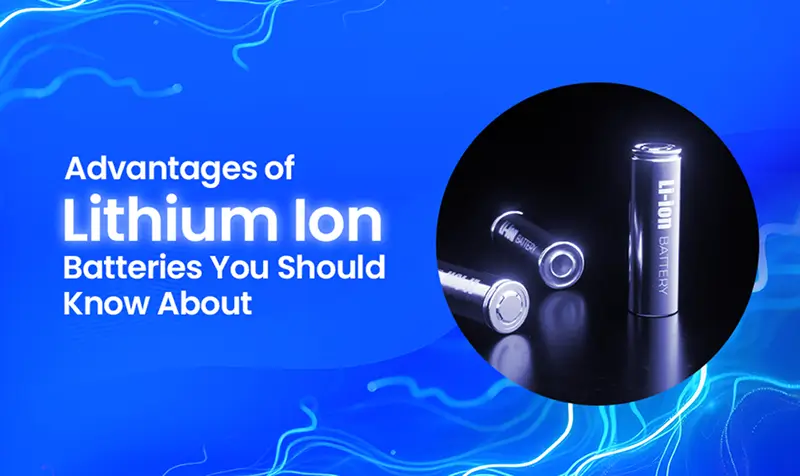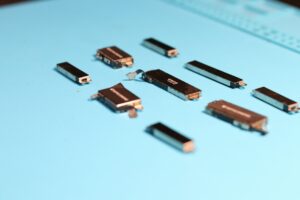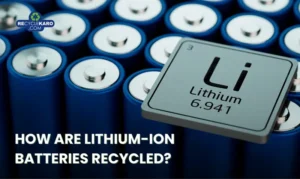Advantages of Lithium Ion Batteries You Should Know About

In today’s world, everything is going wireless and portable — from smartphones and laptops to electric cars and solar systems. One thing that powers all these modern marvels is the lithium-ion battery. You’ve probably heard the term many times, especially when shopping for electronics or checking out electric vehicles (EVs). But what makes these batteries so special?
In this blog, we’ll break down the benefits of lithium-ion batteries in simple, easy-to-understand language. Whether you’re a tech enthusiast or just someone looking for a reliable power source, this guide will help you understand the lithium battery advantages and why they are considered the best lithium batteries available today.
What Are Lithium-Ion Batteries?
Before diving into the lithium-ion battery advantages, let’s quickly understand what they are.
A lithium-ion battery is a type of rechargeable battery. Unlike traditional batteries that you use once and throw away, lithium-ion batteries can be used, recharged, and reused hundreds — sometimes thousands — of times. These batteries are commonly used in:
- Mobile phones and laptops
- Electric vehicles (EVs)
- Solar energy storage systems
- Power tools
- Medical devices
They’ve become the go-to option because they are compact, lightweight, and pack a lot of energy. But that’s just scratching the surface.
Benefits of lithium-ion battery systems
1. High Energy Density
One of the biggest lithium battery advantages is their high energy density. This means they can store a lot of power in a small size.
Imagine your smartphone. It’s slim and lightweight, but it lasts all day. That’s because of the lithium-ion battery inside. In electric vehicles, high energy density allows cars to drive longer distances on a single charge.
So, if you’re looking for the best lithium battery to power your devices or vehicles, high energy density is a major win.
2. Long Lifespan
Another major benefit of lithium-ion batteries is their long life. Compared to older types like nickel-cadmium (NiCd) or even lead-acid batteries, lithium-ion batteries last much longer.
In numbers, li-ion batteries can go through 1000 to 3000 charge cycles, depending on the quality and how they are used. This translates to several years of service without needing a replacement.
This long lifespan makes them a cost-effective choice in the long run, even if the upfront cost is a bit higher.
3. Low Maintenance
Some batteries need regular maintenance to work properly. For example, lead-acid batteries often need water refills and regular cleaning to prevent corrosion. That’s not the case with lithium-ion batteries.
They are virtually maintenance-free. You don’t need to worry about topping them off or constant check-ups. This makes them ideal for people who want convenience and reliability without the hassle.
4. Fast Charging
Let’s face it — nobody likes waiting hours for a battery to charge. One of the key advantages of lithium-ion batteries over other batteries is their fast charging capability.
Whether it’s your phone or your electric car, lithium-ion batteries charge much quicker than traditional alternatives. In fact, many modern li-ion battery systems can reach 80% charge in under an hour.
Fast charging means less downtime and more productivity — a crucial advantage for busy lifestyles and businesses alike.
5. Lightweight and Compact
Lithium-ion batteries are much lighter than other rechargeable batteries of the same capacity, especially lead-acid batteries. This is why they’re used in portable devices and electric vehicles, where weight is a critical factor.
In solar energy systems or RV setups, lithium battery power offers a compact solution that doesn’t take up too much space or weigh down your vehicle.
6. Environmentally Friendly
While no battery is perfect for the environment, lithium-ion batteries are more eco-friendly than many other options. Why?
- They last longer, so fewer batteries are produced and thrown away.
- They don’t contain toxic heavy metals like lead or cadmium.
- They are increasingly being recycled, thanks to improved recycling programs.
So if you’re looking for greener energy options, the benefits of lithium ion battery technology are worth considering.
7. Better Performance in High and Low Temperatures
Unlike some batteries that fail to perform in extreme temperatures, high-quality lithium-ion batteries can operate well in a range of conditions. This makes them ideal for outdoor applications like solar energy systems, camping gear, and electric vehicles used in both hot and cold climates.
This lithium-ion battery’s efficiency under tough conditions is a huge plus for people living in places with extreme weather.
8. Consistent Power Output
One of the often-overlooked lithium battery advantages is their consistent voltage output. With older battery types like lead-acid, the voltage drops as the battery discharges. This means your device starts losing performance even when the battery isn’t empty.
With lithium-ion batteries, you get stable voltage throughout most of the discharge cycle, ensuring your devices run smoothly until it’s time to recharge.
9. Safe and Reliable (with Proper Use)
Safety is a common concern with any battery. While it’s true that lithium-ion batteries can be dangerous if poorly made or misused, high-quality batteries with proper safety features are very safe.
Most best lithium battery brands include:
- Overcharge protection
- Short-circuit protection
- Thermal regulation
- Battery management systems (BMS)
When used correctly and purchased from reputable manufacturers, lithium-ion batteries offer dependable, safe performance for years.
10. Versatile Applications
From personal electronics to massive solar farms, lithium-ion batteries are everywhere. Their ability to scale up or down makes them incredibly versatile.
- Need a small power bank for your phone? Lithium-ion.
- Building a home backup battery for power outages? Lithium-ion.
- Launching an electric car company? Yep — lithium-ion again.
This broad range of applications highlights how lithium-ion is not just good — it’s the best lithium battery solution for many needs.
11. Advantages Over Lead-Acid Batteries
Now let’s get specific about the advantages of lithium-ion battery over lead-acid battery, which are still common in things like golf carts, forklifts, and solar setups.
Here’s how lithium-ion wins:
| Feature | Lithium-Ion Battery | Lead-Acid Battery |
| Energy Density | High | Low |
| Weight | Light | Heavy |
| Lifespan (Charge Cycles) | 2000+ | 300–500 |
| Maintenance | None | Regular required |
| Charge Time | 1–3 hours | 6–10 hours |
| Depth of Discharge (DoD) | Up to 100% | 50% or less |
| Efficiency | 95%+ | 80% or less |
As you can see, the advantages of lithium-ion battery over lead acid battery are pretty clear. While lead-acid batteries are cheaper upfront, lithium-ion batteries are more efficient, last longer, and need less maintenance, making them the better long-term investment.
Read More: Difference between Lead-Acid Batteries & Lithium-ion Batteries
12. Technological Innovation and Future Potential
Lithium-ion batteries continue to improve every year. Research is ongoing into making them even safer, more powerful, and quicker to charge.
Newer versions like lithium iron phosphate (LiFePO4) offer even greater safety and longer life spans, making them ideal for solar and off-grid applications. This evolving technology ensures that the benefits of lithium-ion batteries will only grow with time.
13. High Battery Efficiency
Another powerful benefit of lithium-ion batteries is their high efficiency compared to other types of batteries. Battery efficiency refers to how well a battery stores and releases energy without losses.
Lithium-ion batteries typically offer round-trip efficiencies of 95% or higher. This means that if you charge a lithium-ion battery with 100 units of energy, you can expect to use around 95 of those units when discharging — only a small amount is lost as heat.
In contrast, lead-acid batteries have efficiencies closer to 80% or less, which means more energy is wasted during charging and discharging.
Quick Summary: Why Lithium-Ion Wins over other?
| Feature | Lithium-Ion | Lead-Acid | NiCd | NiMH |
| Energy Density | High | Low | Medium | Medium |
| Weight | Light | Heavy | Heavy | Medium |
| Lifespan (Charge Cycles) | 2000+ | 300–500 | 1000 | 500–1000 |
| Memory Effect | None | No | Yes | Minor |
| Maintenance | None | Required | Low | Low |
| Self-Discharge Rate | Low | Medium | High | Medium |
| Efficiency | 95%+ | ~80% | ~70% | ~75% |
When you look at the full picture, the advantages of lithium ion batteries over other batteries become obvious. They deliver more power, last longer, require less care, and give you more value for your investment.
Conclusion: Why Lithium-Ion Is the Best Choice
There’s a reason why lithium-ion batteries are everywhere — from your pocket to outer space. They offer a powerful combination of efficiency, longevity, reliability, and convenience.
To summarize the lithium battery advantages:
- Long life and low maintenance
- Fast charging and high energy storage
- Lightweight and compact
- Safe and reliable when used correctly
- Versatile for nearly any application
Whether you’re looking to upgrade your power tools, build a solar energy system, or simply buy a reliable battery pack, choosing lithium-ion is a smart move.
With so many advantages of lithium-ion batteries over other batteries, it’s clear why they are considered the gold standard today — and why their future looks even brighter.
FAQs: Lithium-Ion Batteries
1. What are the main benefits of lithium-ion batteries?
Lithium-ion batteries offer many advantages, including long lifespan, high energy density, fast charging, low maintenance, and consistent power output. They are lightweight and suitable for a wide range of applications, from smartphones to electric vehicles and solar systems.
2. Why are lithium-ion batteries better than lead-acid batteries?
One of the biggest advantages of lithium ion battery over lead acid battery is their efficiency and longer life. Lithium-ion batteries last up to 4–5 times longer, charge faster, require no maintenance, and are much lighter. They also allow deeper discharges, which means you can use more of the stored energy without damaging the battery.
3. Are lithium-ion batteries safe?
Yes, lithium-ion batteries are generally safe if used and charged properly. Most high-quality models come with built-in safety features like overcharge protection, thermal control, and battery management systems (BMS). However, poor-quality or damaged batteries can pose risks, so always buy from trusted brands.
4. How long do lithium-ion batteries last?
On average, a lithium-ion battery lasts between 5 to 10 years, or about 2000–3000 charge cycles. This makes them a cost-effective option in the long term compared to other types of rechargeable batteries.
5. What makes lithium-ion batteries efficient?
Lithium ion battery efficiency comes from their high energy density, low internal resistance, and ability to hold a charge for a long time. They also charge faster and waste less energy during use and charging, which improves overall performance.





You can find all the useful information you need on the Vavada mirror. Find out why players switch to the official Vavada website via the mirror, and discover the benefits: similar registration and login processes, bonuses, promo codes